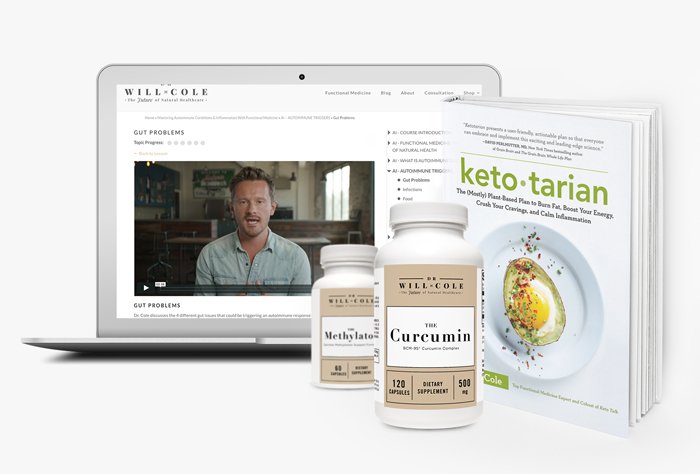13 Tips For Staying Healthy While Eating At A Restaurant

The average American eats out at restaurants four to five times per week, and everyone knows restaurant food isn’t usually health food, with its typically high salt, high sugar content. Many people worry that they’ll never be able to go to a restaurant again if they’re going to lead a healthy life, but that simply isn’t true! Living a health-conscious life and participating in social activities like eating at restaurants are not mutually exclusive. You just need a few simple tips for maintaining your health goals in the presence of temptation. Here’s what to know:
Article continues below
Make Your Life a Cleanse
SUBSCRIBER-ONLY GUIDES FOR GUT HEALTH, VIBRANT ENERGY, HEALTHY FOOD & CLEAN ALCOHOL
Get FREE access to these + giveaways, recipes, & discount codes in personal emails from Dr. Will Cole.
1. Peruse the menu beforehand
Most restaurants have their menu posted on their website, so check it out and plan what you will order before you go. This will help you to make an educated, healthy choice and be less influenced by the pressure to make a quick decision or cave to the pressure of others who may encourage you to make choices you’ll regret.
2. Just say no to the bread and chip baskets
What better way to spoil your appetite, increase your inflammation, and add way too many calories and carbs to your meal than those dreaded baskets of grainy goodness? The truth is, many people have a gluten or grain sensitivity and they don’t even know it, but whether you do or not, filling up on cheap grains before your real dinner arrives is never a good dietary decision.
Add to that the fact that wheat is a genetically hybridized crop, and corn is often genetically modified and hybridized to maximize sugar content (and that’s not even considering the pesticide use on conventional grain crops….).
Even if you don’t have a diagnosed sensitivity, or you know you’re getting an organic wheat or corn, with their empty calories and refined carbohydrates, these nutrient-deficient foods will be an impediment to living a healthy life and feeling good after your meal.
3. BYOCD (Bring Your Own Condiments and Dressings)
This may sound a little extreme (some of my patients tell me it is), but the fact is that the packaged condiments and dressing most likely to be available at restaurants are usually loaded with processed sugars; inflammatory oils like canola, soy and corn; and artificial additives. Keeping healthy versions of these in your purse or bag will ensure you’re not unnecessarily exposing yourself to foods that could harm your health. One brand I recommend is Primal Kitchen which carries many different dressings and condiment options.
4. Pre-load with a healthy snack
What’s the point of going out to eat if you’re just going to eat something first? I’m not suggesting you eat a full meal beforehand, but a small healthy snack can do wonders to curb cravings and prevent overeating or that nose-first dive into the bread or chip basket when you first sit down (before you remember #2 on this list!)
5. Keep it simple
When you’re at a restaurant and are trying to eat to increase rather than decrease your health, a good thing to remember is that simple food is almost always better when you aren’t the one cooking and don’t have control over how food is prepared. A dish without added sauces or breading will be safer from all the additives restaurant flavoring typically contains. Instead, try dishes like grilled or broiled fish or meat with salad greens or steamed vegetables. (And remember – you brought your own dressing!)
6. Don't be afraid to ask questions and make requests
For the less outgoing among us, this can feel difficult, but restaurant servers and chefs want to give you a meal experience you enjoy. If you have questions about the menu or want something prepared in a different way than is stated, just ask. If you feel like you need a good reason, you can always mention that you have some health-related food restrictions.
7. Browse the gluten-free menu
Many restaurants now carry gluten-free choices and while some are better than others at keeping these foods pure and separate from other gluten-containing foods, restaurants that commit to this are worth knowing and patronizing. I’ve written in the past about how going gluten-free can be healthy or unhealthy, depending on your individual sensitivities, but generally speaking, when you know a food doesn’t have gluten, it’s a step in the right direction towards food diversity and an anti-inflammatory meal.
8. Even if it's not an option on the menu, ask to substitute your side dish
You don’t have to eat the French fries, the twice-baked potato, or the rice pilaf, if you are trying to avoid grains, heavy starches, fried foods, or foods drowned in dairy products. Most restaurants will give you a side of steamed vegetables or a salad instead.
9. Get the facts on the cooking oils
Restaurants usually use cheap industrial seed oils, like canola or vegetable oil, to cook with. These oils are highly inflammatory with a high proportion of polyunsaturated omega-6 fats that have a low smoking point and are easily oxidized. I can’t wait for the day when restaurants use coconut oil or grass-fed butter to cook with, but for now, asking for a fat that can withstand heat (like coconut oil or even lard) will be your best option, unless you ask for your food to be grilled without oil or steamed. Olive oil is a great option for cold uses like dressings, but will oxidize easily when heated, so keep that choice on your salad.
10. Avoid salad dressings
You brought your own, right? Normally filled with sugars, bad oils, trans fats, and industrial salt, commercial salad dressings are a nutritional nightmare. If you didn’t bring your own, at least ask for olive oil and vinegar (not the same as a vinaigrette, which typically has those added ingredients). If the restaurant makes their own dressing, ask what the dressing contains.
11. Check the sauces
Asking what’s in the sauce is as important as asking what’s in the dressing. Sauces from restaurants notoriously contain gluten and refined sugars. Asking for olive oil as a sauce is a great healthy alternative – and delicious!
12. Support health-conscious restaurants
Fortunately, in response to public pressure, there are a growing number of restaurants that offer healthful, real-food options. Their menus are filled with delicious, health-promoting choices that can make eating out so much more enjoyable for you! Seek them out in your area and tell them you stand with them by supporting their health-conscious business. You are voting with your dollars!
13. Do your best, then don't stress
Use all of these tips as well as you can, then let the rest go and enjoy yourself! You can’t control everything, so give yourself grace and don’t add more stress to your life. It’s bad for your digestion! Remember that your body is resilient and has survived this long, and what matters most is what you do most often. Now go enjoy some good food and good company!
As one of the first functional medicine telehealth clinics in the world, we provide webcam health consultations for people around the globe.
Photo: Stocksy
Start Your Health Journey Today
FUNCTIONAL MEDICINE CONSULTATIONS FOR PEOPLE AROUND THE WORLD
Shop This Article
Purchase personally curated supplements
and Dr. Will Cole’s books!

The information on this website has not been evaluated by the Food & Drug Administration or any other medical body. We do not aim to diagnose, treat, cure or prevent any illness or disease. Information is shared for educational purposes only. You must consult your doctor before acting on any content on this website, especially if you are pregnant, nursing, taking medication, or have a medical condition.
Our articles may include products that have been independently chosen and recommended by Dr. Will Cole and our editors. If you purchase something mentioned in this article, we may earn a small commission.

BY DR. WILL COLE
Dr. Will Cole, DNM, IFMCP, DC is a leading functional medicine expert who consults people around the globe, starting one of the first functional medicine telehealth centers in the world. Named one of the top 50 functional and integrative doctors in the nation, Dr. Will Cole provides a functional medicine approach for thyroid issues, autoimmune conditions, hormonal imbalances, digestive disorders, and brain problems. He is also the host of the popular The Art of Being Well podcast and the New York Times bestselling author of Intuitive Fasting, Ketotarian, Gut Feelings, and The Inflammation Spectrum.

Gut Feelings
Healing The Shame-Fueled Relationship
Between What You Eat And How You Feel
